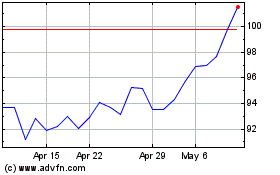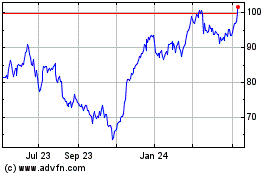Siemens CEO Voices Worries Over U.S. Travel Ban -- Update
February 01 2017 - 3:50PM
Dow Jones News
By Friedrich Geiger
MUNICH -- The chief executive of Siemens AG, the German
industrial giant and one of the biggest foreign corporate investors
in the U.S., took aim at the Trump administration Wednesday --
singling out its moves on immigration and offering some of the
toughest criticism yet by an overseas corporation.
"What we are seeing worries us," Chief Executive Joe Kaeser
said. "America became great through immigrants...I hope that this
great country will recall what has made it great."
Mr. Kaeser is among the most prominent of a clutch of executives
running Germany's large industrial manufacturers, many of which
have relied heavily on the U.S. as a market for exports and
investments. Siemens is also a big U.S. employer, with 50,000
workers in the U.S.
Last year, Mr. Kaeser voiced optimism about the business impact
of President Donald Trump's election. But in comments at a news
conference ahead of Siemens' annual shareholder meeting here
Wednesday, he changed tack. He took specific aim at Mr. Trump's
executive order Friday that suspends entry to the U.S. for refugees
and restricts visitors from seven, majority-Muslim countries that
Washington has singled as particular terrorism threats.
Mr. Kaeser also appeared eager to explain his criticism, which
stood out as a stark departure from the reticence that big global
businesses typically deploy in responding to politics and
politicians in their overseas markets. That is especially the case
among the button-down corporate culture that dominates Germany AG,
which relies so much on exports. He said such prudence shouldn't
translate into avoiding all criticism of Mr. Trump.
"One must not mix up prudence with gestures of servility," he
said. Alluding to Germany's Nazi and Communist past, he said:
"Perhaps we Germans are a bit sensitive when it comes to walls and
race."
Trump administration officials and their allies have argued that
the travel restrictions are needed to keep the U.S. safe from
potential terrorists, and say the measure has broad support.
The Trump travel order triggered broad political criticism in
Germany and around the world. But business leaders here have also
become worried about what Trump policies will mean for the bottom
line, given America's status as the top market for German
exports.
The Trump administration has recently taken wider aim at German
economic policy and business practices. The new administration has
criticized what it says is Germany's outsize sway in European
economic policy and its big trade surplus with the U.S.
Peter Navarro, Mr. Trump's top trade adviser, told the Financial
Times earlier this week that Germany was exploiting the U.S. and
other European Union countries with a "grossly undervalued euro."
German Chancellor Angela Merkel responded that Germany had always
supported the independence of the European Central Bank, and "we
seek to remain competitive with everyone else in global trade."
Berlin and the Obama administration, too, had clashed in the
past on Germany's large trade and current-account surpluses.
Washington has accused the German government of relying too much on
exports, including exports to the U.S., to feed growth while not
doing enough to stimulate domestic demand, which could attract more
imports from overseas. The U.S. imported $105 billion in goods from
Germany last year and exported only $45 billion to the country.
Mr. Trump has also taken recent aim at specific German
companies. Last month, in an interview with Germany's Bild Zeitung,
he threatened German car makers with a 35% tariff on cars imported
into the U.S. from their plants in Mexico.
"You go down Fifth Avenue, everybody has a Mercedes-Benz parked
in front of his house," Mr. Trump said in the interview before his
inauguration. "How many Chevrolets do you see in Germany? Maybe
none...you don't see anything at all over there. It's a one-way
street."
General Motors Co. doesn't sell Chevrolet models in Europe and
instead markets its popular Opel and Vauxhaul brands. German Vice
Chancellor Sigmar Gabriel responded that if U.S. car makers want to
sell more in Germany, "they just have to build better cars."
Mr. Kaeser said Wednesday that Siemens is a major employer in
the U.S. and that it exports more from the U.S. than it imports to
the country.
Write to Friedrich Geiger at friedrich.geiger@wsj.com
(END) Dow Jones Newswires
February 01, 2017 15:35 ET (20:35 GMT)
Copyright (c) 2017 Dow Jones & Company, Inc.
Siemens (PK) (USOTC:SIEGY)
Historical Stock Chart
From Mar 2024 to Apr 2024

Siemens (PK) (USOTC:SIEGY)
Historical Stock Chart
From Apr 2023 to Apr 2024
